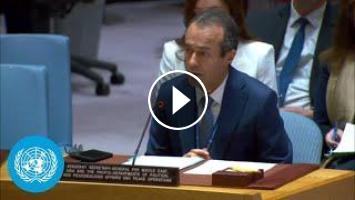Briefing by Khaled Khiari, Assistant Secretary-General for Middle East, Asia and the Pacific in the Departments of Political and Peacebuilding Affairs and Peace Operations, on Non-proliferation/Democratic People’s Republic of Korea.
"Mr. President,
At 10:44 PM local time on 27 May, the Democratic People’s Republic of Korea (DPRK) conducted what it described as “the launch of reconnaissance satellite Malligyong 11 aboard the new type satellite carrier rocket” from the Sohae Satellite Launching Station. According to the DPRK, the launch failed “due to the air blast of the new type satellite carrier rocket during the first stage flight”, as a result of the “reliability of operation of the newly developed liquid oxygen and petroleum engine”. This follows the successful launch of a satellite on 21 November 2023.
In December 2023, the DPRK announced that it will launch three additional military satellites in 2024. While the DPRK issued a pre launch notification to the Japanese Coast Guard, it did not issue airspace or maritime safety notifications to the International Civil Aviation Organization or the International Telecommunications Union. The DPRK’s unannounced launches represent a serious risk to international civil aviation and maritime traffic.
Mr. President,
As stated on previous occasions, sovereign states have the right to benefit from peaceful space activities. However, Security Council resolutions expressly prohibit the DPRK from conducting any launches using ballistic missile technology. On 28 May, the Secretary General strongly condemned the attempted launch of yet another military satellite using ballistic missile technology. He reiterated his call on the DPRK to fully comply with its international obligations under all relevant Security council resolutions and to swiftly return to dialogue without preconditions to achieve the goal of sustainable peace and the complete and verifiable denuclearisation of the Korean Peninsula.
Mr. President,
Developing a military reconnaissance satellite was part of the DPRK’s five year military development plan, unveiled in January 2021. In line with the plan, the DPRK has significantly increased its missile launch activities since 2022, including more than 100 launches using ballistic missile technology, in violation of the relevant Security Council resolutions. Since the beginning of the year, the DPRK has launched two intermediate range solid fuelled ballistic missiles in January and April, respectively.
As previously highlighted, there is a need for practical measures to reduce tensions, reverse the dangerous dynamic, and create space to explore diplomatic avenues. The Secretary General has emphasised the importance of re-establishing communication channels, particularly between military entities. Exercising maximum restraint is critical to avoid unintended escalation.
Mr. President,
The DPRK’s persistent pursuit of nuclear weapons and ballistic missile programmes, in violation of relevant Security Council resolutions, continues to un dermine the global nuclear disarmament and non proliferation regime, and the Treaty on the Non Proliferation of Nuclear Weapons (NPT) that underpins it.
On 30 April, the mandate of the Panel of Experts that supported the Committee expired, after having been continuously extended since 2009 when the Panel was first established by the Security Council. We remain deeply concerned about growing tensions on the Korean Peninsula. We encourage all Member States, and Members of this Council, to seek unity, and for all parties to create an environment conducive to dialogue and cooperation. At this particularly difficult moment in securing global peace and security, it is imperative to de escalate the rising tensions on the Korean Peninsula.
Mr. President,
Separately, I want to highlight that the United Nations and its partners are ready to assist the DPRK in addressing the basic needs of its vulnerable populations. We note that international travel to and from the DPRK is now taking place at a growing rate. We encourage the DPRK authorities to facilitate the full return of the international community, including the United Nations Resident Coordinator and the UN Country Team. A collective return would enhance international support for the people of the DPRK and the implementation of the 2030 Agenda.
Thank you, Mr. President".
"Mr. President,
At 10:44 PM local time on 27 May, the Democratic People’s Republic of Korea (DPRK) conducted what it described as “the launch of reconnaissance satellite Malligyong 11 aboard the new type satellite carrier rocket” from the Sohae Satellite Launching Station. According to the DPRK, the launch failed “due to the air blast of the new type satellite carrier rocket during the first stage flight”, as a result of the “reliability of operation of the newly developed liquid oxygen and petroleum engine”. This follows the successful launch of a satellite on 21 November 2023.
In December 2023, the DPRK announced that it will launch three additional military satellites in 2024. While the DPRK issued a pre launch notification to the Japanese Coast Guard, it did not issue airspace or maritime safety notifications to the International Civil Aviation Organization or the International Telecommunications Union. The DPRK’s unannounced launches represent a serious risk to international civil aviation and maritime traffic.
Mr. President,
As stated on previous occasions, sovereign states have the right to benefit from peaceful space activities. However, Security Council resolutions expressly prohibit the DPRK from conducting any launches using ballistic missile technology. On 28 May, the Secretary General strongly condemned the attempted launch of yet another military satellite using ballistic missile technology. He reiterated his call on the DPRK to fully comply with its international obligations under all relevant Security council resolutions and to swiftly return to dialogue without preconditions to achieve the goal of sustainable peace and the complete and verifiable denuclearisation of the Korean Peninsula.
Mr. President,
Developing a military reconnaissance satellite was part of the DPRK’s five year military development plan, unveiled in January 2021. In line with the plan, the DPRK has significantly increased its missile launch activities since 2022, including more than 100 launches using ballistic missile technology, in violation of the relevant Security Council resolutions. Since the beginning of the year, the DPRK has launched two intermediate range solid fuelled ballistic missiles in January and April, respectively.
As previously highlighted, there is a need for practical measures to reduce tensions, reverse the dangerous dynamic, and create space to explore diplomatic avenues. The Secretary General has emphasised the importance of re-establishing communication channels, particularly between military entities. Exercising maximum restraint is critical to avoid unintended escalation.
Mr. President,
The DPRK’s persistent pursuit of nuclear weapons and ballistic missile programmes, in violation of relevant Security Council resolutions, continues to un dermine the global nuclear disarmament and non proliferation regime, and the Treaty on the Non Proliferation of Nuclear Weapons (NPT) that underpins it.
On 30 April, the mandate of the Panel of Experts that supported the Committee expired, after having been continuously extended since 2009 when the Panel was first established by the Security Council. We remain deeply concerned about growing tensions on the Korean Peninsula. We encourage all Member States, and Members of this Council, to seek unity, and for all parties to create an environment conducive to dialogue and cooperation. At this particularly difficult moment in securing global peace and security, it is imperative to de escalate the rising tensions on the Korean Peninsula.
Mr. President,
Separately, I want to highlight that the United Nations and its partners are ready to assist the DPRK in addressing the basic needs of its vulnerable populations. We note that international travel to and from the DPRK is now taking place at a growing rate. We encourage the DPRK authorities to facilitate the full return of the international community, including the United Nations Resident Coordinator and the UN Country Team. A collective return would enhance international support for the people of the DPRK and the implementation of the 2030 Agenda.
Thank you, Mr. President".
- Category
- United Nations
- Tags
- UN, United Nations, UNGA
Be the first to comment













